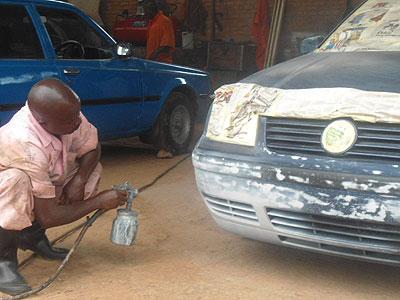He has spent 10 years in Nyarugenge Prison so far, where he is serving a thirty-year sentence. But after spending that long behind bars, one would imagine how hard life will be for Kabanda when he completes his jail term in 20 years’ time. However, according to Kabanda, it will be another chapter of his life when he finally gets out of prison.


He has spent 10 years in Nyarugenge Prison so far, where he is serving a thirty-year sentence. But after spending that long behind bars, one would imagine how hard life will be for Kabanda when he completes his jail term in 20 years’ time. However, according to Kabanda, it will be another chapter of his life when he finally gets out of prison.
"When I was incarcerated 10 years ago, I didn’t have any skills. But now I am a skilled mechanic capable of solving various mechanical problems in various vehicles,” he says confidently – and proudly. Today, Kabanda teaches his fellow inmates motor vehicle mechanics and has become a master at Nyarugenge Prison Garage.
Kabanda is just one of the inmates who have benefited from the vocational skills training offered in all Rwandan correctional centres as a way of giving inmates a starting point after serving their sentences. The Deputy Commissioner General of Rwanda Correctional Services, Mary Gahongayire, says this vocational training programme is offered in all the 14 correctional centres across the country.
Inmates are equipped with skills in carpentry, welding, tailoring, plumbing, electric installation, hotel management and construction among other disciplines. These centres offer certificates for those who successfully complete these courses.
At Nyarugenge Prison, there are 300 inmates pursuing different courses, which run for a period of one year – 6 months for theories and 6 months for practicals.
Funny Nyirasafari, the in-charge of human rights who oversees the programme’s implementation at Nyarugenge Prison, says inmates are given a chance to determine which courses they want to pursue.
"Tutors are also inmates but professional in their respective fields,” says Nyirasafari.
She explains that this also helps the trainers to keep in touch with their professions, arguing that this builds on their competence. She adds that it is also one way of making those who complete their sentences useful to the country.
Last year, the president of Prison Fellowship International (PFI), Ronald W. Nikkel, visited these correctional centres when he was in the country. He commended the government and called upon other countries to borrow a leaf from Rwanda. PFI is an association of prison organisations from England, Australia, Canada, New Zealand and the Bahamas.




